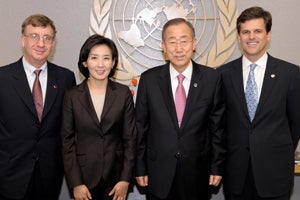HLS Professor William Alford ’77, a member of the executive committee of the board of directors of Special Olympics International and chair of its research and policy committee, met with U.N. Secretary-General Ban Ki-moon in November to discuss disability issues. Alford was a participant in the meeting at the invitation of Timothy Shriver, chairman of Special Olympics, and Na Kyung-won, a member of the South Korean Congress who has been at the forefront of disability rights legislation.
Earlier this year, the World Health Organization and the World Bank together issued a major study putting the number of people with disabilities at 15 percent of the world’s population—over a billion people.
The goal of the meeting, said Alford, was to bring more attention to disability issues and in particular to underscore ways in which the work of the Special Olympics lines up with the focus of the secretary general, in particular the U.N. Millennium Development Goals, which include eradicating extreme poverty.
“A disproportionate share of people with disabilities live in developing countries and are all too often among the poorest of the poor,” said Alford. “And within the disability world, I think it’s fair to say that people with intellectual disabilities are the often most vulnerable,” he added.
“We talked specifically about the work of Special Olympics,” said Alford, “a large and growing proportion of which is in developing countries.” Special Olympics does many things, including organizing free sports and educational programs for persons with intellectual disabilities in more than 170 nations: there are approximately 135 competitions daily around the world as well as a World Games every four years in the winter and summer. Alford, who is vice dean for the HLS Graduate Program, director of East Asian Legal Studies and an expert on Chinese law, helped to organize the 2007 games in Shanghai which drew 7,500 athletes from around the world and were opened by China’s president. He has also helped broker the next winter games, which will take place in South Korea in 2013 and will be co-chaired by Congresswoman Na Kyung-won. The organization also provides free health services—over a million checkups—for individuals who have an intellectual disability and sponsors research and seeks to advance the cause of people with intellectual disabilities in the public arena.
“We spoke with the secretary-general about the goals underneath all of this,” said Alford. It’s not motivated by “pity or obligation,” but the desire to help people realize their potential. “Our experience at the Special Olympics is that the athletes we work with have an amazing range of talents, on and off the playing field, and one key objective is fostering outlets through which these might be expressed.”
Another topic discussed was the U.N. Convention on the Rights of Persons with Disabilities—the first human rights convention of the 21st century, said Alford, who is cofounder with Michael Stein ’88 of the Harvard Law School Project on Disability. HPOD’s work includes assisting countries that have ratified the U.N. convention to make sure their legal frameworks support the new obligations they have taken on under the treaty.
“It was a really good meeting,” Alford said. “The secretary-general seemed very engaged. We agreed that there would be follow on between the Special Olympics and the secretary-general and his senior advisers about concrete ways that we can help in the further facilitation of the Millennium Development Goals.”
“It makes sense,” said Alford. “If a larger purpose of the MDG is to advance the well being of vulnerable people, we are trying to advance the well being of the most vulnerable of the vulnerable.”
